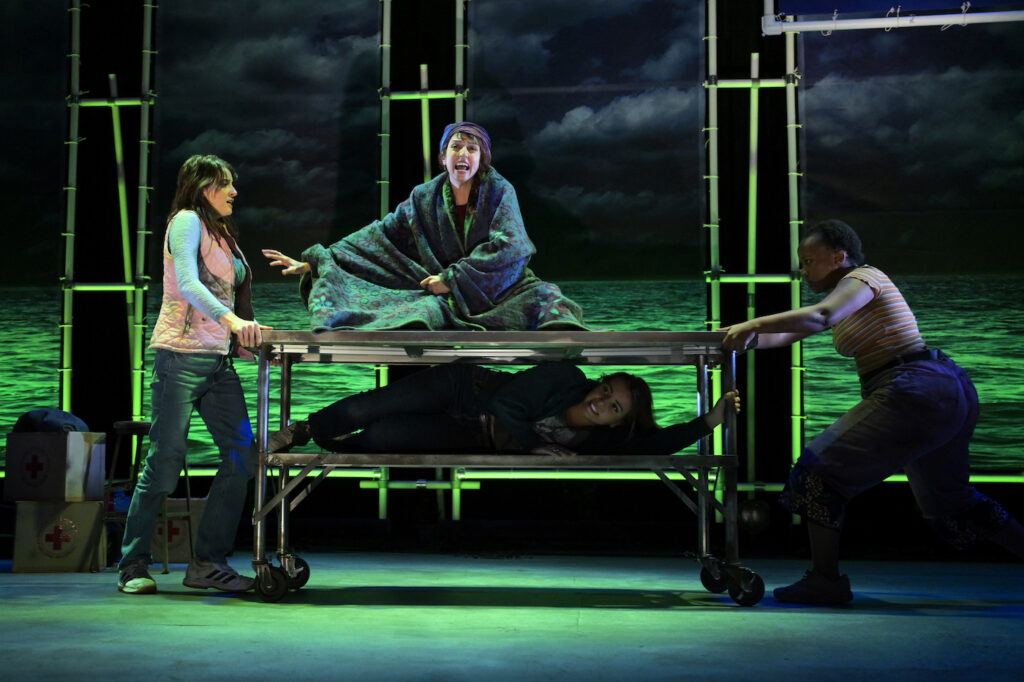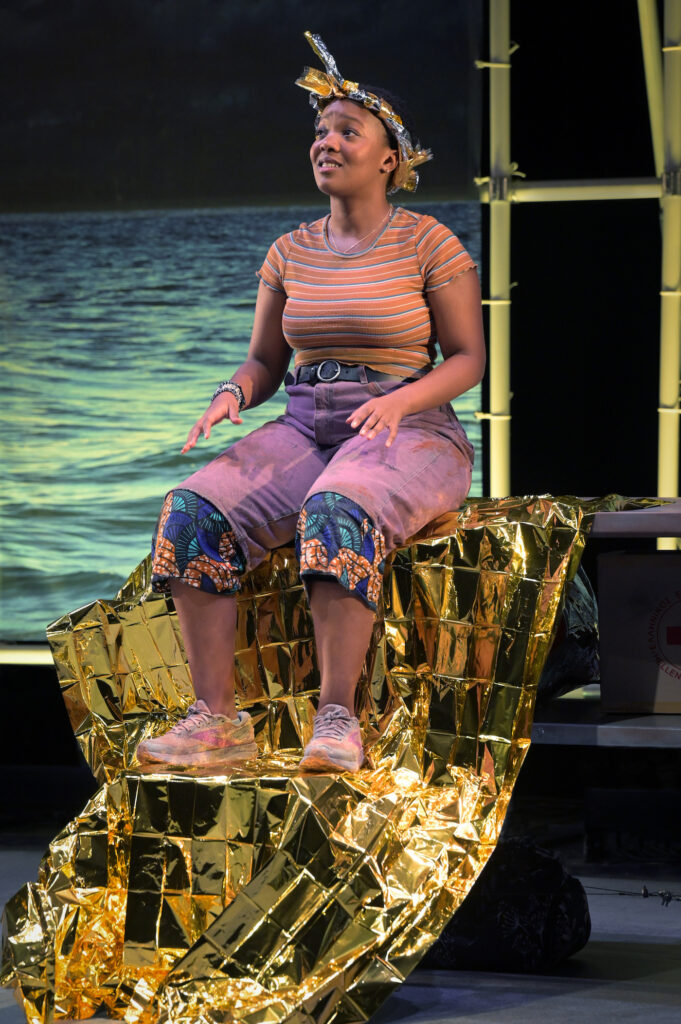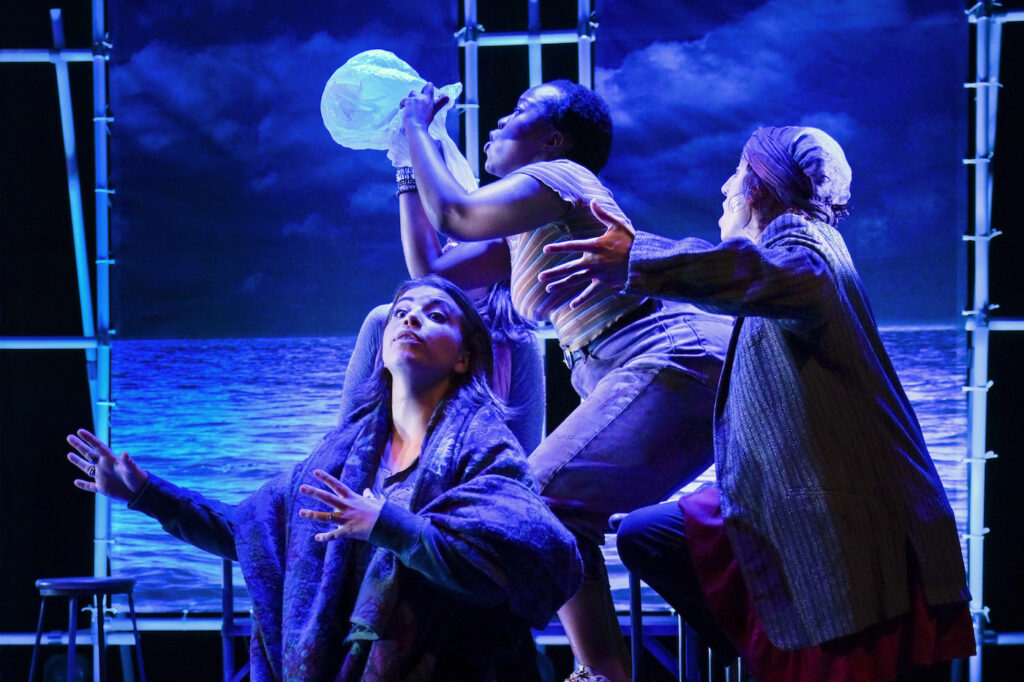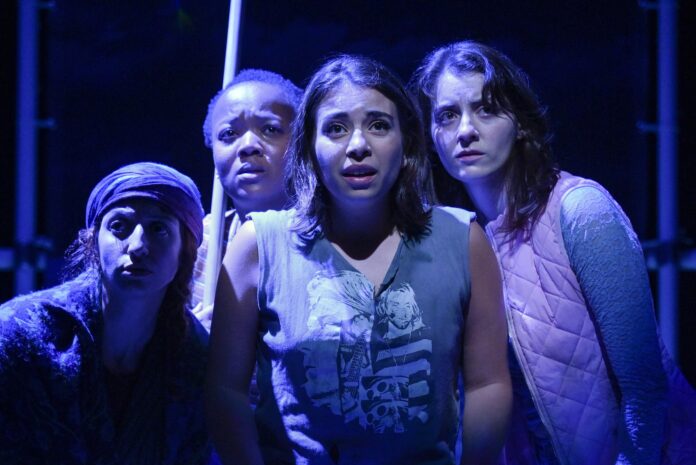I came upon a few surprises during my first-ever trip to the Marin Theatre Company. Days before I arrived, I was surprised to find that their “everyone masked” policy—which compelled me to attend in the first place—had quietly switched to a mostly-mask-optional schedule (à la Berkeley Rep and Aurora). Upon entering the Boyer Theatre, I was surprised by its intimate size. Most importantly, I was surprised at how well director and adaptor Lisa Peterson did what other productions couldn’t: make reading a book on stage look interesting.
Based only on its bare details, Peterson’s new adaptation of Homer’s Odyssey (through September 24 at the Marin Theatre Company in Mill Valley) should be a slough. After all, it’s co-production with a New York troupe (The Acting Company) based entirely around the characters sitting around reading Emily Wilson’s translation, a paperback version of which is a prop—the classic text. One is reminded of Elevator Repair Service’s painfully pretentious Gatz (performed at Berkeley Rep in pre-pandemic 2020), in which The Great Gatsby is read in its entirety for seemingly no other reason than “just because.”

Fortunately, Peterson, The Acting Company, and MTC succeed where Gatz failed miserably because Peterson and Co. don’t blindly revere their chosen text. In fact, as our multinational quartet of characters—Kenyan Zee (Zamo Mlengana), Tunisian Anoud (Layla Khoshnoudi), Syrian Béa (Sophie Zmorrod), and Albanian Hana (Anya Whelan-Smith)—begin reading Anoud’s cherished paperback copy, Anoud has a tough time selling the other three on the story. When Zee reads the opening line, “Tell me about a complicated man,” she immediately turns to her companions and scoffs, “Who cares?”
Anoud cares. Quite a lot, actually. The reasons how and why are slowly revealed over the 100-minute runtime.
But first, some scene-setting: the four women we meet are in Greece as refugees. They find themselves in a state of diplomatic limbo as they each await word if they’ll be transferred to their homelands, to safe spaces away from their homelands, or just away from this seaside camp where they now find themselves. They sit anxiously among boxes of first aid kits and bottled water, waiting for alerts announced over the staticky PA speaker that hangs above them.
It isn’t long before Anoud suggests passing the time by both reading and acting out the story from her paperback. The other three aren’t as familiar with Homer’s epic. When Anoud begins laying out the basic details, Zee remarks that Odysseus is no different than the mercenaries she’s seen back home. Still, the three go along, swept up by Anoud’s infectious child-at-play glee that turns gold foil blankets into royal thrones, subs in broom handles for spears and canes, and employs a wheeled cart for several ships at sea.

During the proceedings—which rarely feature the paperback; our four intuitively recite dialogue the way characters in a musical already know lyrics—it isn’t lost on our four that The Odyssey, like a great many “classic” tales, is really damned sexist. They begin and end with Odysseus landing on Calypso’s island, which drives our four to stop the story cold and point out the hypocrisy of the hero either shagging or being lusted after (or both) by every woman he encounters on the way back home to his chaste wife. Hana even asks why most (not all) of the monsters are identified as female. That each of the four gets to perform as the title character is as much a necessity given those present as it is a chance to experience the power fantasy of being one of the Western world’s most revered mythical heroes. (At one point, they all perform him at once.)
It’s also an opportunity for the women to work through a great deal of PTSD they’ve suffered as they shuffle from country-to-country in the hopes of finding safety. They occasionally break (Odyssey) character to acknowledge things like how the treacherous journey to see Hades isn’t all that different from a dangerous refugee escape. What’s more, the story’s overarching message that one “can’t go home again” resonates with the four who wonder aloud if they’d even recognize their homelands if they returned. Hana, in a heartbreaking moment, declares she’d never want to go back to Albania after having been smuggled out like contraband.
Help us save local journalism!
Every tax-deductible donation helps us grow to cover the issues that mean the most to our community. Become a 48 Hills Hero and support the only daily progressive news source in the Bay Area.

Peterson’s post-modern take on the myth delicately balances the relevance of a classical text through modern eyes as it highlights the way trauma hasn’t changed much in several millennia. She directs a talented cast with a steady hand across Tanya Orellana’s minimalist set. (Orellana’s gorgeous sets tend to be either intricately detailed or stunningly able to suggest more space than the actual construction will show.) Where it could use a bit of pruning is in the denouement, in which Anoud’s affinity for the book, and its symbolism to her personally, is laid bare. Peterson dwells on a few details a bit too long, with Odysseus’ subsequent old man disguise nearing repetitiousness after Anoud’s confession. I see why both were added, but they stretch a bit too much, especially when an already-sad ending takes place next.
Another surprise during my excursion to MTC was that I wasn’t the only one masked. I’d say a good 35-40% of patrons kept their faces covered inside. (The opening night house was probably 80% full.) What’s more, the MTC’s HVAC system, while making the theatre a bit chilly, kept a steady enough air flow to where my Aranet4’s CO² readings never got higher than about 902ppm: In fact, they floated around the mid-800s the entire show.
I can’t say for sure if or when I’ll ever make the long trek back up to Mill Valley. Having said that, Peterson’s adaptation was a pretty good way to spend an evening in the North Bay. It reimagines the Greek legend through the eyes of women steeped in the refugee experience. It’s a somber and entertaining reminder that although one can’t go home again, there’s always value in living to tell the tale.
ODYSSEY’s world premiere runs through September 24 at the Boyer Theatre of the Marin Theatre Company, Mill Valley. Tickets and further info here.






